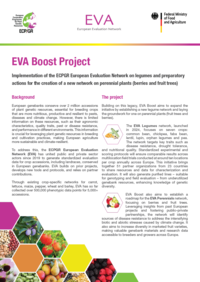EVA Projects
The EVA networks have been operating since 2019, supported by funding from Germany, the European Commission and ECPGR. A summary of the different project activities is provided below.

Project GenRes2019-2: Implementation of EVA networks for Maize, Wheat, Barley, Carrot, Lettuce and Pepper (2019–2025)
Following up on the establishment of the European Evaluation Network EVA by the Steering Committee, the ECPGR Secretariat submitted a successful proposal to Germany for funding of a project to kick-start the EVA networks on wheat and barley and vegetables (carrot, lettuce and pepper) for three years (2019–2022), extended until March 2025 with extra funding for additional activities and to include also a network for Maize. Relevant project documents are available here.
Within the project, five crop-specific EVA networks were initiated, with partnerships between 12 and 47 partners. Find all organizations participating in EVA as well as reports of annual project meetings on the various network pages.
For field crops (maize, wheat, barley) several batches of European genebank accessions were multiplied and then evaluated over several years in multiple locations for disease resistance and other agronomic traits of interest. Vegetable networks worked on defined sets of accessions, for which extensive data on agronomical, biotic and abiotic stress traits were collected.
By December 2024, the EVA networks have jointly produced more than half a million datapoints on over 5,700 crop accessions:
| All Networks | EVA Wheat & Barley | EVA Carrot | EVA Lettuce | EVA Pepper | EVA Maize | |
| Crops | 15 | 3 | 1 | 2 | 1 | 1 |
| Accessions | 5,741 | 3,730 | 67 | 367 | 261 | 1,018 |
| Partner Institutes | 90 | 47 | 14 | 12 | 16 | 18 |
| Countries of Operation | 34 | 25 | 8 | 8 | 13 | 9 |
| Experiment Locations | 122 | 59 | 14 | 6 | 11 | 30 |
| Traits | 392 | 50 | 172 | 26 | 40 | 60 |
| Evaluation Trials | 425 | 289 | 27 | 18 | 17 | 74 |
| Phenotypic Data Points | 598,469 | 358,673 | 95,875 | 11,646 | 26,019 | 106,256 |
All evaluated accessions were genotyped and this data will be made available in public data repositories. All phenotypic data were collected in a EURISCO-EVA intranet and will be made widely available via EURISCO after an embargo period, which incentivized the collaboration of private breeders. Historic C&E data on wheat, barley and maize were also collected and curated for EURISCO and are now publicly available.
The work of the EVA Networks was disseminated through presentations at international conferences and several peer-reviewed publications.
Finally, this project also contributed to the establishment of a new EVA Legumes network, funding the project meeting of the ForEVA project in 2023.
This project thus laid the groundwork for the self-sustaining continuation of EVA networks, supported by in-kind contributions of partners and through additional projects.
Activated Genebank Network (AGENT) (2020–2025)

The AGENT project, funded by the European Union’s Horizon 2020 research and innovation programme under Grant Agreement No. 862613, provided support for an extension of the EVA Wheat and Barley network. The genebanks involved in AGENT created a collection of unique wheat and barley single-seed descent lines, totalling more than 6,000 accessions each, which were genotyped and regenerated for basic evaluation. The EVA Wheat and Barley network included 750 accessions in their evaluations in 2023–2024, generating additional valuable data on them and showing how stakeholder engagement can contribute to the exploitation of results generated in EU projects.
Fostering the need for implementation of the ECPGR European Evaluation Network (EVA) on grain legumes (2023–2024)
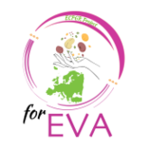
In 2023, the ECPGR Grant Scheme Activity ‘Fostering the need for implementation of the ECPGR European Evaluation Network (EVA) on grain legume (ForEVA)’ by the Grain Legumes Working Group brought together 21 genebank partners from the Working Group and more than 30 stakeholders from the public and private sector to develop a new EVA network for legumes. During an in-person meeting in Bucharest on 11-12 October 2023, the partners agreed to establish an EVA Legumes network comprising seven different crop groups (bean, chickpea, faba bean, lentil, lupine, pea and orphan legumes) and involving more than 50 partners. The networks started in 2024, with crop groups meeting to develop work plans, defining first accession sets and starting regenerations of beans and chickpeas. The final activity report is available here.
Implementing a trans-European Pepper Landrace collection for resilient agriculture (2024–2026)
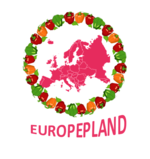
Another ECPGR Grant Scheme Activity 'EuroPepLand' was funded during the first call in Phase XI and will implement a trans-European pepper landrace collection for resilient agriculture. The project involves 16 members of the Solanaceae Working Group and three self-funded partners under the coordination of Working Group Chair Pasquale Tripodi. This activity provides an opportunity to extend the membership of the EVA Pepper network and enlarge the pepper diversity available for multilocation field trials within the network. The project kicked off with a joint meeting of EVA Pepper and EuroPepLand on 30-31 October 2024 in Almeria, Spain.
MAize LAndraces traits phenomic prediction using Near InfraRed Spectra (2024-2027)
The ECPGR Grant Scheme Activity ' MALANIRS ' was also funded during the first call in Phase XI and will use a combination of genomics and phenomics to develop a model for predicting specific traits from genebank materials using Near Infrared spectra (NIRs). The project, coordinated by Stephane Nicolas, involves 14 Maize Working Group members and will link with the SusCrop-ERA-NET project MineLandDiv and the EVA Maize network, adding new partners and exploring new maize diversity for breeding. The project will run for three years, starting in September 2024.
Implementation of the ECPGR European Evaluation Network (EVA) on legumes and preparatory actions for the creation of a new network on perennial plants (berries and fruit trees) – EVA Boost (2024–2027)
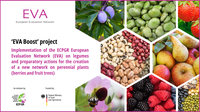
In 2024, a new funding proposal (276,6 KB) to the German Ministry of Food and Agriculture was approved for the implementation of the EVA Legumes network, providing funds for regeneration and specific evaluation activities in all seven crop groups.
The overall goal is to evaluate a total of at least 700 legume accessions from European collections in multilocation trials with up to 10 locations per accession, including on-farm. The project will exploit historic data and existing materials from previous projects, such as INCREASE, and also develop SSD lines of previously understudied European genebank materials.
In addition, the EVA Boost project aims to establish a framework and roadmap for a new EVA Perennials network, focusing on berries and fruit trees, through organization of a workshop involving relevant ECPGR Working Groups and interested stakeholders.
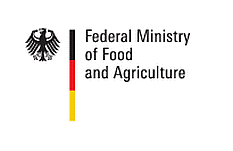
and Agriculture for the period 2019-2027.


